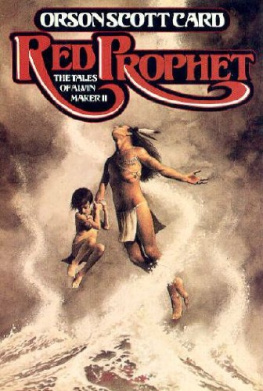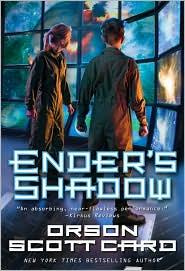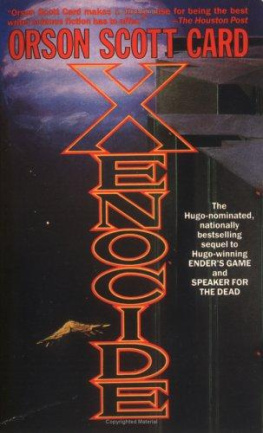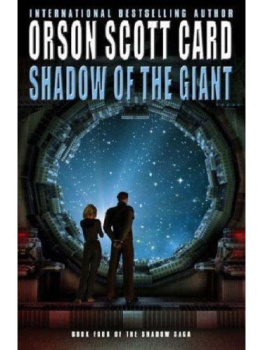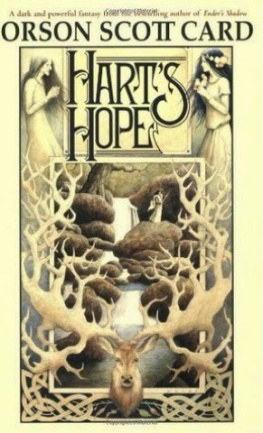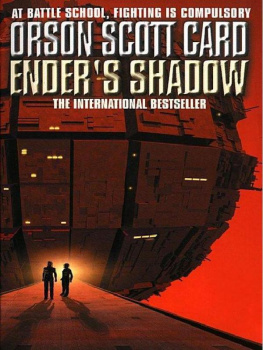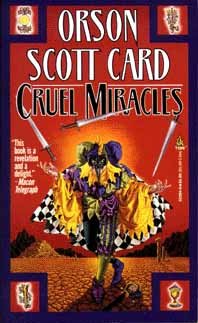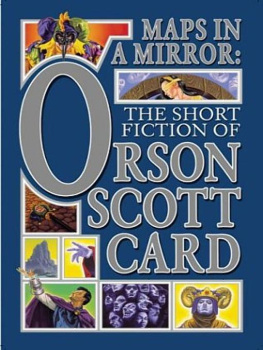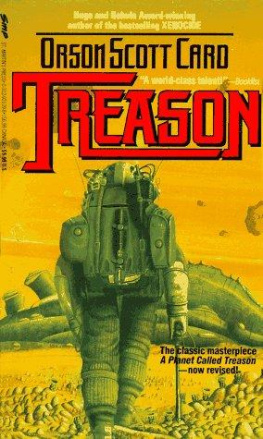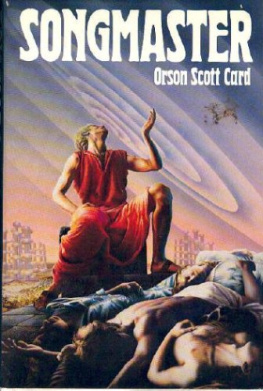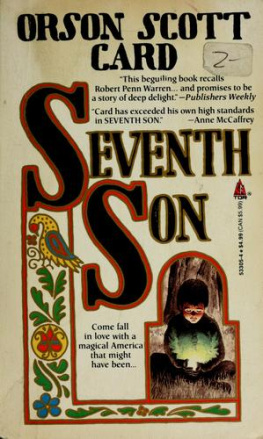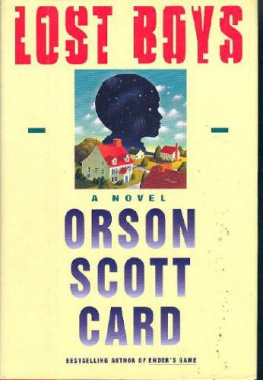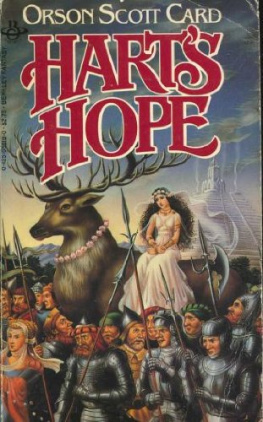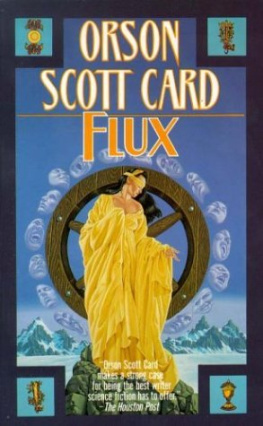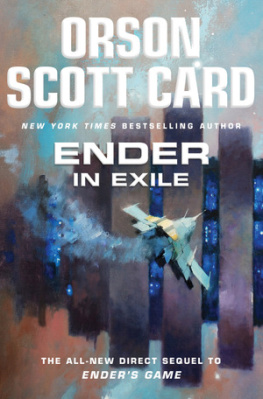Orson Scott Card
Cruel Miracles
MORTAL GODS
The first contact was peaceful, almost uneventful: sudden landings near government buildings all over the world, brief discussions in the native languages, followed by treaties allowing the aliens to build certain buildings in certain places in exchange for certain favors-- nothing spectacular. The technological improvements that the aliens brought helped make life better for everyone, but they were improvements that were already well within the reach of human engineers within the next decade or two. And the greatest gift of all was found to be a disappointment-- space travel. The aliens did not have faster-than-light travel. Instead, they had conclusive proof that faster-than-light travel was utterly impossible. They had infinite patience and incredibly long lives to sustain them in their snail's-pace crawl among the stars, but humans would be dead before even the shortest space flight was fairly begun.
And after only a little while, the presence of aliens was regarded as quite the normal thing. They insisted that they had no further gifts to bring, and simply exercised their treaty rights to build and visit the buildings they had made.
The buildings were all different from each other, but had one thing in common: by the standards of the local populace, the new alien buildings were all clearly recognizable as churches.
Mosques. Cathedrals. Shrines. Synagogues. Temples. All unmistakably churches.
But no congregation was invited, though any person who came to such a place was welcomed by whatever aliens happened to be there at the time, who engaged in charming discussion totally related to the person's own interests. Farmers conversed about farming, engineers about engineering, housewives about motherhood, dreamers about dreams, travelers about travels, astronomers about the stars. Those who came and talked went away feeling good. Feeling that someone did, indeed, attach importance to their lives-- had come trillions of kilometers through incredible boredom (five hundred years in space, they said!) just to see them.
And gradually life settled into a peaceful routine. Scientists, it is true, kept on discovering, and engineers kept on building according to those discoveries, and so changes did come. But knowing now that there was no great scientific revolution just around the corner, no tremendous discovery that would open up the stars, men and women settled down, by and large, to the business of being happy.
It wasn't as hard as people had supposed.
- - -
Willard Crane was an old man, but a content one. His wife was dead, but he did not resent the brief interregnum in his life in which he was solitary again, a thing he had not been since he came home from the Vietnam War with half a foot missing and found his girl waiting for him anyway, foot or no foot. They had lived all their married lives in a house in the Avenues of Salt Lake City, which, when they moved there, had been a shabby, dilapidated relic of a previous century, but which now was a splendid preservation of a noble era in architecture. Willard was in that comfortable area between heavy wealth and heavier poverty; enough money to satisfy normal aspirations, but not enough money to tempt him to extravagance.
Every day he walked from 7th Avenue and L Street to the cemetery, not far away, where practically everyone had been buried. It was there, in the middle of the cemetery, that the alien building stood-- an obvious mimic of old Mormon temple architecture, meaning it was a monstrosity of conflicting periods that somehow, perhaps through intense sincerity, managed to be beautiful anyway.
And there he sat among the gravestones, watching as occasional people wandered into and out of the sanctuary where the aliens came, visited, left.
Happiness is boring as hell, he decided one day. And so, to provoke a little delightful variety, he decided to pick a fight with somebody. Unfortunately, everyone he knew at all well was too nice to fight. And so he decided that he had a bone to pick with the aliens.
When you're old, you can get away with anything.
He went to the alien temple and walked inside.
On the walls were murals, paintings, maps; on the floor, pedestals with statues; it seemed more a museum than anything else. There were few places to sit, and he saw no sign of aliens. Which wouldn't be a disaster; just deciding on a good argument had been variety enough, noting with pride the fine quality of the work the aliens had chosen to display.
But there was an alien there, after all.
"Good morning, Mr. Crane," said the alien.
"How the hell you know my name?"
"You perch on a tombstone every morning and watch as people come in and go out. We found you fascinating. We asked around." The alien's voicebox was very well programmed-- a warm, friendly, interested voice. And Willard was too old and jaded with novelty to get much excited about the way the alien slithered along the floor and slopped on the bench next to him like a large, self-moving piece of seaweed.
"We wished you would come in."
"I'm in."
"And why?"
Now that the question was put, his reaso seemed trivial to him; but he decided to play the game all'the way through. Why not, after all? "I have a bone to pick with you."
"Heavens," said the alien, with mock horror.
"I have some questions that have never been answered to my satisfaction."
"Then I trust we'll have some answers."
"All right then." But what were his questions? "You'll have to forgive me if my mind gets screwed around. The brain dies first, as you know."
"We know."
"Why'd you build a temple here? How come you build churches?"
"Why, Mr. Crane, we've answered that a thousand times. We like churches. We find them the most graceful and beautiful of all human architecture."
"I don't believe you," Willard said. "You're dodging my question. So let me put it another way. How come you have the time to sit around and talk to half-assed imbeciles like me? Haven't you got anything better to do?"
"Human beings are unusually good company. It's a most pleasant way to pass the time which does, after many years, weigh rather heavily on our, um, hands." And the alien tried to gesture with his pseudopodia, which was amusing, and Willard laughed.
"Slippery bastards, aren't you?" he inquired, and the alien chuckled. "So let me put it this way, and no dodging, or I'll know you have something to hide. You're pretty much like us, right? You have the same gadgets, but you can travel in space because you don't croak after a hundred years like we do; whatever, you do pretty much the same kinds of things we do. And yet-yet--"
"There's always an 'and yet,'" the alien sighed.
"And yet. You come all the way out here, which ain't exactly Main Street, Milky Way, and all you do is build these churches all over the place and sit around and jaw with whoever the hell comes in. Makes no sense, sir, none at all."
The alien oozed gently toward him. "Can you keep a secret?"
"My old lady thought she was the only woman I ever slept with in my life. Some secrets I can keep."
"Then here is one to keep. We come, Mr. Crane, to worship."
"Worship who?"
"Worship, among others, you."
Willard laughed long and loud, but the alien looked (as only aliens can) terribly earnest and sincere.
"Listen, you mean to tell me that you worship people?"
"Oh, yes. It is the dream of everyone who dares to dream on my home planet to come here and meet a human being or two and then live on the memory forever."
And suddenly it wasn't funny to Willard anymore. He looked around-- human art in prominent display, the whole format, the choice of churches. "You aren't joking."
Next page

